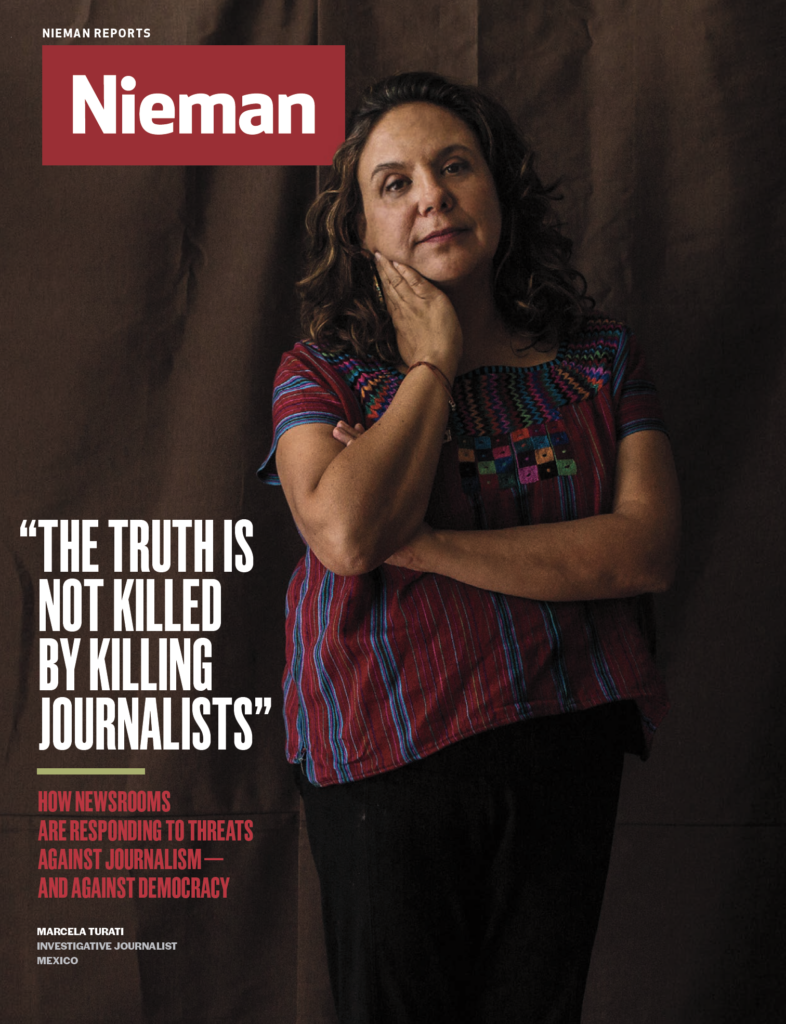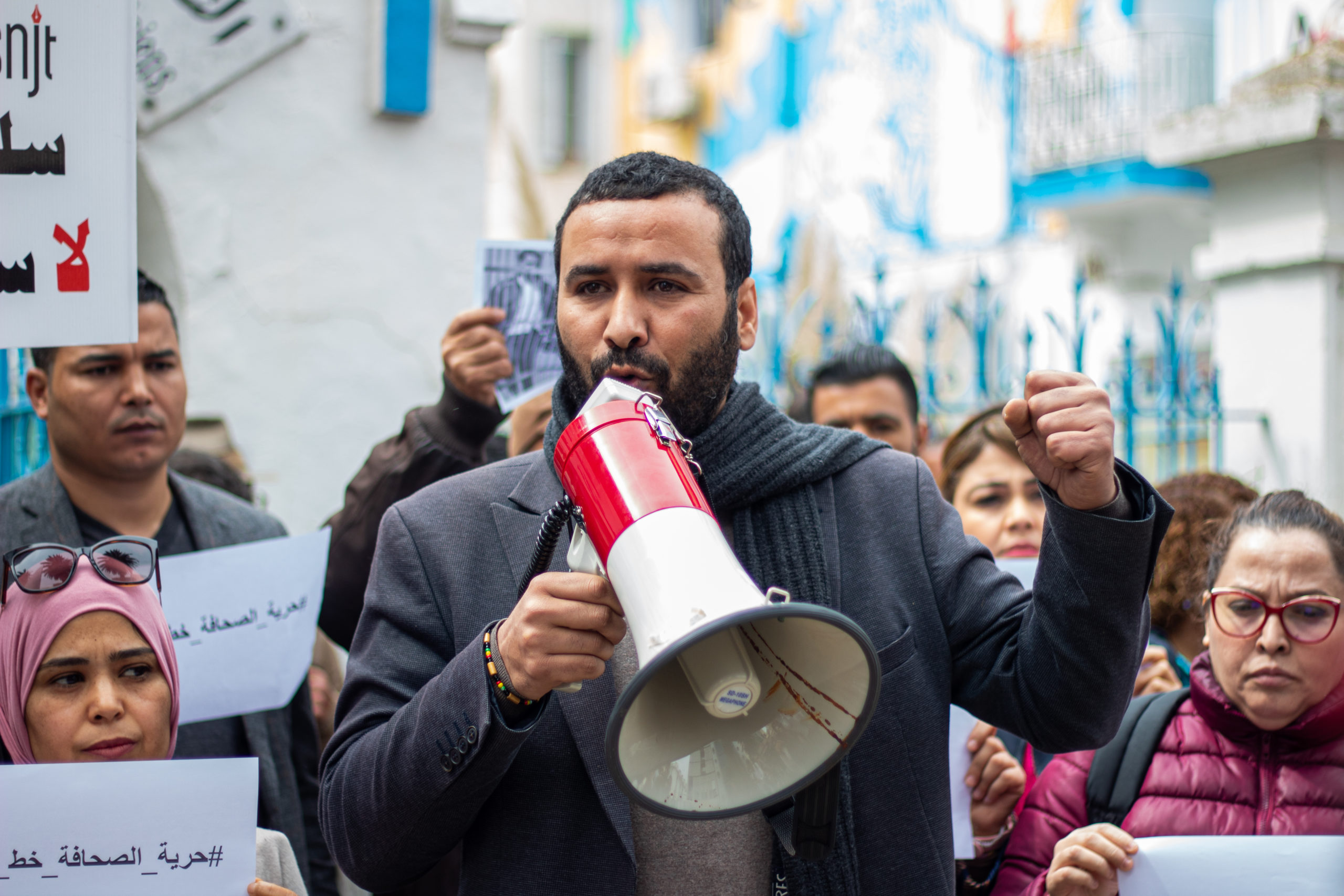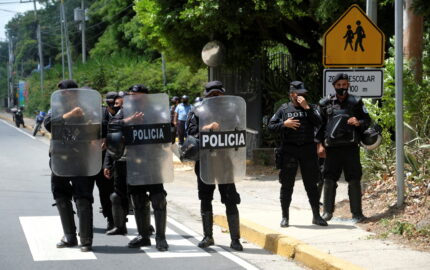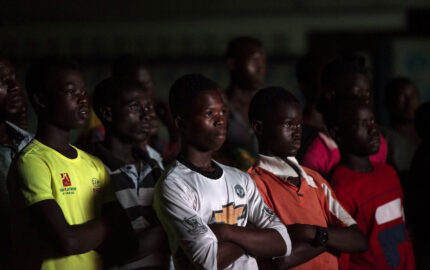
From Kashmir to Russia to Mexico and beyond, journalism is under threat. Reporters Without Borders estimates that nearly three-quarters of the 180 countries on its World Press Freedom Index either completely or partially block the work of newsrooms. The threats to journalists are physical, political and, especially under authoritarian regimes, increasingly existential. In our Reporting at Risk series,
Nieman Reports is publishing essays by journalists who are managing to do vital independent reporting — often at great personal risk.
In the early morning of Oct. 3, 2021, Amer Ayed, a Tunisian journalist and TV presenter at Zitouna TV, was sleeping when police circled his home in the city of Monastir and dragged him in for questioning. “They scared my family and my children, and they didn’t give me even the time to change my clothes,” Ayed recalls.
He was charged with conspiring against state security and insulting the dignity of the president and the army. His supposed crime? Reciting on Oct. 1 “The Ruler,” a poem written by exiled Iraqi poet Ahmed Matar that calls out the abuses of Arab dictators. In the same broadcast, Ayed criticized Tunisian President Kais Saied’s move on Sept. 22 to suspend parts of the constitution and declare that he would rule without the input of Parliament. Ayed said it was a “coup d’etat” and called Saied a populist.
The police also shut down Zitouna TV, a private channel created in 2012 by Oussama Ben Salem, a son of Mohamed Ben Salem and a leader in Ennahda (the Tunisian Muslim Brotherhood), an Islamist political party.
After spending two months in jail, Ayed was released while his trial was ongoing. In April of this year, a military court sentenced him to four months in prison, a sentence he is appealing.
Ayed is not the only journalist facing repercussions for his work. Since July 25, 2021, when Saied suspended Parliament and dismissed the prime minister, Tunisia has slid backward from the democratic gains it made following the Jasmine Revolution, a month-long civil protest that led to the ouster of President Zine El Abidine Ben Ali in January 2011, who had been in office for 23 years. In 2014, the Tunisian constitution enshrined the right to “freedom of opinion, thought, expression, information and publication.”
But those rights began to be dismantled the day after Saied consolidated power, when police stormed the offices of Al Jazeera’s bureau, forcing journalists to leave and confiscating their equipment. Nearly a year later, the office remains closed. “We [never] received any official explanation for the closure or any adjudication,” says Lotfi Hajji, the Al Jazeera Tunisia bureau chief. “It was an arbitrary decision and one of the first indicators of the regression of freedom of expression in Tunisia.” Saied has also scheduled a referendum on July 25 of this year to vote for a new constitution that will further erode the power of parliament, which Saied’s political opponents say will give him dictatorial powers.
This year, Tunisia dropped 21 spots on the World Press Freedom Index, published by Reporters Without Borders, slipping to 94 from 73 out of 180 countries. Journalists on every platform face real pressure as they navigate the new political situation and an environment that is growing increasingly hostile. “Practicing journalistic work becomes very difficult,” says Mohamed Yassine Jelassi, president of the Tunisian Journalists Union (SNJT). “The whole general environment in the country is full of hate speech against journalists. In fact, every time they cover [demonstrations] in the street, they are either attacked by the police or by the president’s supporters.”
According to the SNJT’s annual report on freedom of press in Tunisia, released in May, there were 214 attacks against journalists — consisting of physical and verbal aggression, incitement to violence, virtual harassment, confiscation of material, and arbitrary detention — between May 2021 and April 2022, most of them perpetrated by official authorities and social media activists supporting Saied. “If you are working for media that is not pro-Saied, you will be attacked verbally or physically, harassed, and prevented from exercising your profession by the police and the protesters,” notes Aymen Touihri, a photographer and journalist who works for Kashf Media, an independent news website. The crackdown comes on top of the Covid-19 crisis, which has forced a handful of media organizations, especially newspapers, in Tunisia to shutter and others to move to digital-only editions. More than 190 journalists, according to SNJT, lost their jobs by early May 2020 because of the pandemic. That number is likely much higher now.
The intimidation of Tunisian journalists is meant to silence their criticisms of the regime. On March 18, police arrested Khalifa Guesmi, a correspondent for Radio Mosaïque, Tunisia’s most listened to radio station, under a terrorism law to force him to reveal his sources in Kairouan in central Tunisia. Guesmi spent a week in jail, during which he was harassed by investigators. “It is a shame that a journalist is arrested to reveal his sources,” says Guesmi. “I’m still shocked by the treatment that I had during the investigations. I was accused [of being] a traitor.” He believes the ordeal was an attempt to intimidate Radio Mosaique, which has been critical of Saied’s consolidation of power.
On June 11, Salah Attia, a journalist working for Aray Al Jadid, a website that covers politics, economics, and international news, from was arrested and jailed after declaring on Al Jazeera television that Saied ordered the army to arrest leaders of a labor union to prevent a strike. He was accused by a military court of threatening state security and the army.
Despite the challenges, some independent outlets still offer quality independent journalism. AlQatiba, a site specializing in investigative journalism founded in September 2020, was part of a media consortium that exposed how wealthy clients and clients who had been convicted of crimes like fraud and bribery used Credit Suisse to avoid paying taxes and get around financial disclosure laws. In August 2021, the organization also published an extensive explanatory article detailing the different possible governing scenarios for Tunisia after Saied seized more power on July 25.
AlQatiba is not alone. Other independent news outlets like Inkyfada — a non-profit based in Tunis — and Nawaat — a public interest newsroom — are continuing to do critical and quality journalism. Inkyfada published in March a data visualization project detailing how police violence has led to the deaths of at least 20 people in the last decade and explaining how newly formed police unions have made it difficult to hold people accountable. In June, Nawaat published an article criticizing Saied’s dismissal of 57 judges without due process.
Walid Mejri, the founder of AlQatiba, says it’s up to the independent press to inform the audience. Now perhaps more than ever reliable information is needed to help Tunisians understand the major events in the country. But the future, he says, is uncertain — as it is in many places around the world where freedoms are being restricted.
And for the media, the landscape is likely to get worse before it gets better.
Hanène Zbiss is a Tunisian investigative journalist, trainer, and teacher of journalism in IPSI (Press Institut and Information Sciences) in Tunis. She is also President of the Tunisian Section of the International Union of Francophone Press (UPF) and the winner of the Samir Kassir Award in 2014 and Rawf Badawi Award for Courageous Journalists in 2019.


